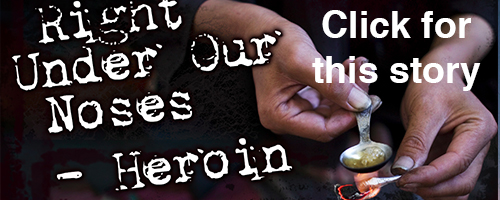SAN ANTONIO – Addiction treatment can be a tricky topic.
A loved one’s addiction can be addressed, but professionals caution that they can’t be coaxed into recovery.
Therapy
Cindy Warden, a licensed chemical dependency intern at the Center for Health Care Services (CHCS), a unique treatment site in Bexar County that specializes in substance abuse care, said there is no judgment on a person because addiction is a disease.
“If you can’t do 24 hours, you can do 12,” Warden said. “It’s possible, for sure.”
“It’s not a moral thing, it's not a matter of willpower. It really is a disease,” she said.
Warden said that disease, the addiction, is so complex that it’s not as simple or easy as just quitting. She said some people think if the addict just loved their children more, or just wanted to quit a little more, that they could. But, she said, it’s much more than that.
“I’ve always sort of understood addiction as a disease and people are helpless, and there’s so much misinformation and judgment,” she said. “It’s a great opportunity to be able to reach people that other people aren’t interested in helping.”
Outreach Treatment
Fighting any type of addiction is easier said than done.
People who are struggling with addiction can get help at the In-House Recovery Program provided by CHCS. The four-month program can sometimes not be enough and the road back to abusing is typically the outcome for those who have fallen out of recovery.
That is one of the many concerns for CHCS and why a grant was proposed in 2013 to fund a pilot project that would increase peer-support services, reach individuals with a personalized, recovery-oriented approach, and help individuals maintain recovery by successfully integrating them into their communities.
The program is staffed by three peer-recovery coaches who are all in long-term recovery but now serving as that median to restore the lives of addicts.
The peer coaches are involved the moment an addict enrolls in the In-House Recovery Program at CHCS. That’s when peer coaches establish a connection with the addicts, based on their own history of addiction.
Noe Gonzalez, one of the peer-recovery coaches for the project, is in long-term recovery for past alcohol and substance addiction.
Having lived through the process of addiction, Gonzalez said his experience makes it easier for someone to be open about his or her own addiction and is how they’re able to reach them in a different way.
“Sometimes it can’t really happen through clinicians or certain professionals,” Gonzalez said. “So this way we are able to meet them where they’re at.”
According to Texas Department of State Health Services, the project has seen positive outcomes for those participating in long-term recovery coaching.
READ: Journey to redemption: Addicts share stories of loss, recovery
Some of the positive outcomes from May 2014 – June 2015 have been: An increase in number of participants housed and living in residences that they either personally own or rent, an increase in number of participants having a full-time and/or part-time employment, and an increased rates of abstinence and/or reduced use.
Men vs. women in recovery
The way men and women come to recovery is different, as well.
For women, Warden said, the motivation is generally family related. Men can have a different reasons for wanting to get clean.
“Not all the time, but a lot of times women come in here initiated by (Child Protective Services), by trying to get better for their children. That motivated a lot of our women,” Warden said. “With our men -- and this is not across the board -- ( they may be) middle-aged and they spent a good deal of their lives incarcerated. They’re motivated by … staying out of prison.”
Lessons learned
Lessons can be learned from the stories of addiction. One of them is that it’s hard to be compassionate for some, Warden said.
“They’re not the most sympathetic population,” she said. “They do bad things and they behave badly. They’re just sick people.”
Another is that recovery is possible.
SLIDESHOW: Celebrity deaths from opioid overdoses
“Recovery is so possible,” Warden stressed. “The reason Alcoholics Anonymous and Narcotics Anonymous has thrived is because it works one day at a time.”
It just takes time.
“If you can’t do 24 hours, you can do 12,” Warden said. “It’s possible, for sure.”
